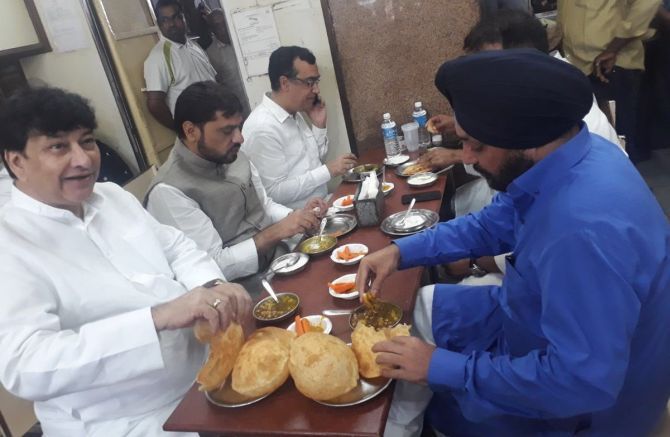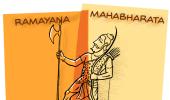As politicians fast to score brownie points, they should know that not every fast has a desirable ending, says Arundhuti Dasgupta.

IMAGE: A photograph of Congress leaders in Delhi eating before sitting on a fast was circulated on social media, April 9, 2018. Photograph: ANI
There is something disturbing about a photograph of well-fed men gorging on plates full of greasy food just before a much-publicised hunger strike.
So when members of the Congress party, clad in the trademark politician's uniform of all-white kurta-pyjamas were caught doing just that, hawk-eyed social media trolls were quick to swoop down on their chicanery.
The feast eroded the sacrificial piety that the party was plumping for, but nothing can quite take away from the power of the fast as a symbol of sacrifice, be it among the poor and powerless or the rich and powerful.
Prime Minister Modi too undertook a one-day fast to protest the disruption of Parliament by Congress members.
Denying oneself the pleasure of food has always been a potent symbol.
It has been used in literary narratives, in political protests and people's movements and in nearly every culture, is imbued with deep religious overtones.
In some instances it is used to show displeasure, as Kaikeyi famously did to Dasaratha to demand that he make Bharata the king of Ayodhya.
In myths, it is also used to draw the attention of the major gods; Parvati, for example, survived on just fruits and roots and then soon gave that up, too, when she sought to win Shiva's love.
There are numerous instances of the severe fast that kings and gods have undertaken to seek a boon of immortality or victory over a strong rival.
The practice was also absorbed into the organised religious framework and a fast then formed part of a set of severe hardships set down for ascetics and monks in Hinduism, Jainism and Buddhism.
It is a form of penitence among some followers of Christianity when, during the Lent period, they give up certain foods and luxuries.
In Islam fasting is compulsory for all (healthy) adults during the month of Ramadan and there are many examples of similar practices in other religions too.
Remarkably in Hinduism, the fast as a symbol of personal purification, repentance, protest and whatever else transformed itself into one of sacrifice.
Instead of blood sacrifice, the devotee soon turned to self-denial as a form of prayer.
This came about when a group from within the religion condemned the animal sacrifices that had become rampant among its followers and also under the influence of pacifist religions such as Buddhism.
Violence that is at the heart of such practice was replaced by a non-violent ritual. And it is this aspect of the fast that Mahatma Gandhi evoked so successfully in his battle against British colonial rule, giving new life to the concept of ahimsa that is wound inextricably around the ritual of fasting in several festivals in the region.
The fast also formed a key element of the practice of vratas in India.
Vrata means a vow or a resolve and it usually denotes an individual's decision to give something up to get something in return. It could involve forgoing food, going on a pilgrimage or carrying out a gruesome sacrifice.
Vratas have led to an entire category of folk literature about the lives of gods and goddesses in the form of vrata-kathas -- these were mostly narrated and heard by women.
There is a dark side to these kathas that were also used to reinforce the gender inequalities that marked the social structures of the time.
The priestly classes used these stories to set down the rules for a good wife whose life was to be dedicated to the welfare of her husband and children.
Men could fast, too, along with their wives, but the family honour was not tied to their abstinence as much as it was for that of women, some of these tales declared.
However, as politicians continue to use the ancient practice to score brownie points in their present-day electoral battles, it may be wise to know that not every fast results in a desirable ending.
The story about Ravana and his mother being a case in point.
A great devotee of Shiva, Ravana's mother was distraught when she discovered that the Shivalinga that she worshipped had been stolen by the king of gods, Indra.
She went on a fast until death or the return of the idol. Ravana undertook a severe penance to bring it back, which he did, but in the end lost it again because he failed to keep a condition that Shiva had set for the safe return of his prized possession.
Ravana was asked not to set the idol down on the ground under any condition, however, fate decreed otherwise and Ravana lost the idol.
For the Indian political parties, if they are to truly use the power of a fast, it may be better to measure their commitment to the cause they are willing to go hungry for.











